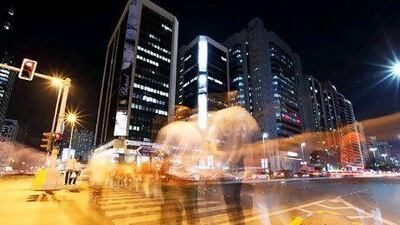Whether we are confronting the challenges of climate change or the problems posed by the growing scarcity of commodities such as carbon fuels and metals, technologies that boost efficiency have never been as vital as they are today.
Enhanced efficiency saves not only raw materials and energy but also brings significant financial benefits. Implementing such technologies on a large scale could help to tackle some of today's most pressing problems in the Middle East and elsewhere.
For the foreseeable future, primary energy demand will continue to be met largely by conventional resources - oil, gas and coal, with nuclear and hydro energy also playing a role.
The reason is clear. Global power demand grows at a pace of 2.8 per cent annually and will reach 37,100 terawatt hours in 2030 from 22,100 last year.
Whatever way you look at it, coal and gas will continue to dominate the way we generate power, meeting nearly two thirds of global demand in 2030. To be sure, renewables will have their share in the future energy mix, increasing to about 13 per cent of the total in 2030 from 4 per cent last year. Including hydro power, renewables will have a share of 28 per cent. But renewables alone will not be able to satisfy demand.
With that in mind: what can we do to ensure that future power needs will be met without increasing the pressure on natural resources and the environment?
One answer is that we need to improve energy efficiency. Boosting efficiencies in existing infrastructure such as power plants as well as industrial plants and even office and apartment buildings can go a long way towards reducing the impact of energy use on the environment and saving natural resources.
The technologies that are at play vary. Building power stations that use highly efficient gas turbines can make a difference.
Improving the efficiency of those turbines is crucial. Because natural gas is relatively clean burning, its role in power generation will increase, in particular in power stations that combine gas turbines with steam turbines.
These power stations convert fuel into electrical energy and heat at the same time - usually in the form of steam and hot water - and can reach fuel efficiency of more than 90 per cent.
As more such power stations are being built, the focus will be on making them more efficient, using the most advanced gas turbines.
As an example, from next year, six Siemens gas turbines with an efficiency of more than 60 per cent in combined cycle mode - a record - will be operating in the American state of Florida, where upgrades to the state's power plants will yield the operator, Florida Power & Light, net savings of almost US$1 billion (Dh3.67bn) over the full life cycle of the turbines.
In the Middle East, where many utilities are operating combined-cycle power plants, the Shuweihat S2 complex in Abu Dhabi is another example of efficient power generation using Siemens turbine technology. By 2030, the share of combined-cycle power plants among all power-generating facilities in the Middle East will increase significantly. While in 2011, 29 per cent of the region's total installed capacity of about 332 gigawatt (GW) was produced by combined-cycle facilities, in 2030 such plants will generate 41 per cent, or 311GW, of an overall installed capacity of 758GW.
It is such projects that support countries in their effort to manage a surge in energy demand while at the same reducing the impact of energy use on the environment and saving natural resources. This is of particular importance in the Middle East, where rapidly growing populations and a push towards industrialisation are driving energy consumption at an unprecedented pace.
The application of energy efficient solutions will be essential in tackling this challenge and many experts agree that this kind of sustainable model is the only possible option for economic growth.
Michael Suess is a member of the managing board of Siemens and the chief executive of the company's energy sector

